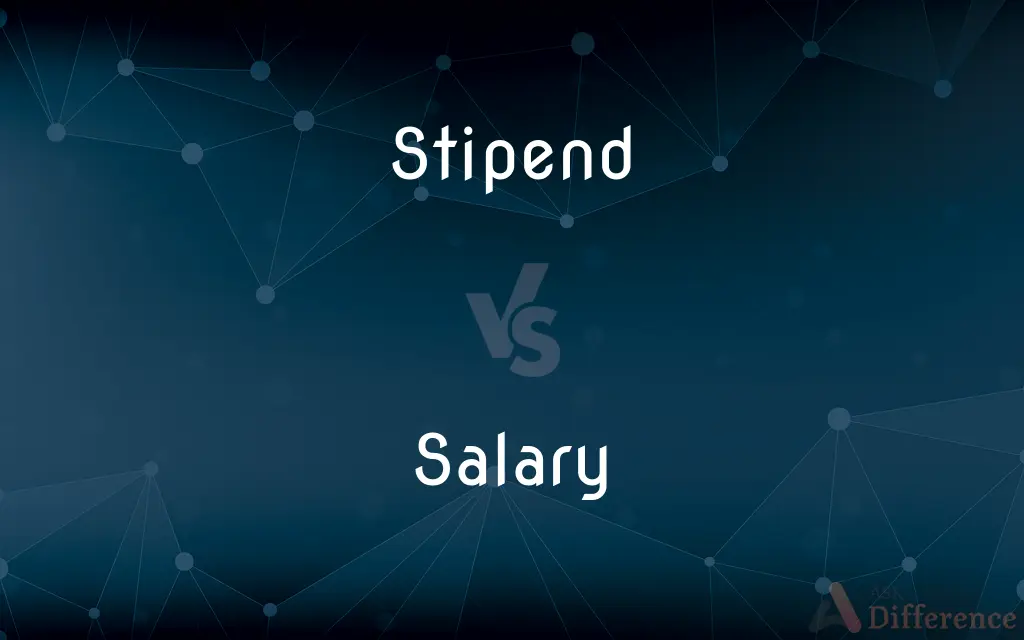Stipend vs. Salary — What's the Difference?
By Tayyaba Rehman — Updated on August 28, 2023
A stipend is a fixed, often modest, payment made periodically for services or to defray expenses, while a salary is a regular payment for professional work, typically paid monthly or biweekly.

Difference Between Stipend and Salary
Table of Contents
ADVERTISEMENT
Key Differences
Stipend and salary, though both relate to compensation, cater to distinct contexts. A stipend is typically a predetermined amount paid to individuals, often to cover expenses or as a token compensation for their services. This payment is common in academic, religious, or non-profit settings, where the main goal isn't profit, but rather research, learning, or service. Stipends are common for interns, volunteers, or researchers who might not be engaged in profit-making activities.
Conversely, a salary pertains to the professional world, signifying a consistent payment made to employees for their work. Salary is often the primary source of income for professionals and is typically determined based on the value of the job in the market, experience, and qualifications. Unlike stipends, salaries usually come with expectations of specific job responsibilities and performance metrics.
Furthermore, while stipends might not always be subject to the same taxation or benefits as salaries, salary packages often include various benefits like health insurance, paid vacations, and retirement plans. The consistency and amount of a salary are usually more stable and predictable compared to stipends, which might be given once or for a limited duration.
In essence, while both stipend and salary serve as compensations, their context, purpose, and often, their amounts differ considerably. Stipends are often more about support, while salaries are compensation for professional expertise and service.
Comparison Chart
Nature
Fixed, often modest payment for services or to defray expenses.
Regular payment for professional work.
ADVERTISEMENT
Purpose
To cover expenses or as a token compensation.
Compensation for professional service.
Duration and Frequency
Can be one-time or for a limited duration; may be less frequent.
Typically consistent and paid monthly or biweekly.
Associated Benefits
Usually doesn't come with job benefits.
Often includes benefits like health insurance, bonuses, and paid vacations.
Taxation
Might not always be subject to standard income tax rules.
Typically subject to income tax and other deductions.
Compare with Definitions
Stipend
A fixed payment given periodically
She received a monthly stipend for her internship.
Salary
Regular compensation for professional employment
His new job offered a competitive salary.
Stipend
Compensation for services, often modest
The volunteer's stipend barely covered his expenses.
Salary
A fixed amount paid to an employee
She negotiated her salary during the interview.
Stipend
A sum granted to support scholarly or artistic activities
The research stipend allowed him to continue his studies.
Salary
Monthly or biweekly wages for services rendered
The company adjusts salaries annually for inflation.
Stipend
Monetary support given to someone in a non-professional capacity
The organization provided a small stipend to its volunteers.
Salary
Payment excluding hourly wages
His salary package included additional benefits.
Stipend
Payment made to cover living or related expenses
His stipend as a grad student helped with housing costs.
Salary
A salary is a form of periodic payment from an employer to an employee, which may be specified in an employment contract. It is contrasted with piece wages, where each job, hour or other unit is paid separately, rather than on a periodic basis.
Stipend
A stipend is a regular fixed sum of money paid for services or to defray expenses, such as for scholarship, internship, or apprenticeship. It is often distinct from an income or a salary because it does not necessarily represent payment for work performed; instead it represents a payment that enables somebody to be exempt partly or wholly from waged or salaried employment in order to undertake a role that is normally unpaid or voluntary, or which cannot be measured in terms of a task (e.g.
Salary
A fixed regular payment, typically paid on a monthly basis but often expressed as an annual sum, made by an employer to an employee, especially a professional or white-collar worker
He received a salary of £24,000
A 15 per cent salary increase
Stipend
(by extension)
Salary
Pay a salary to
The Chinese system—salary the doctor and stop his pay when you get ill
Stipend
Some other form of fixed (and generally small) payment occurring at regular intervals, such as an allowance, a pension, or (obsolete) a tax. 16
Pocket money
My stipend for doing public service is barely enough to cover living expenses.
Salary
To pay, or agree to pay, a salary to; to attach salary to; as, to salary a clerk; to salary a position.
Stipend
(education) A scholarship granted to a student. 20
Salary
Predetermined annual or monthly compensation
She received her salary on the first of every month.
Stipend
Money which is earned; an income.
Salary
Fixed compensation for services, paid to a person on a regular basis.
Stipend
A fixed and regular payment, such as a salary for services rendered or an allowance.
Salary
A fixed amount of money paid to a worker, usually calculated on a monthly or annual basis, not hourly, as wages. Implies a degree of professionalism and/or autonomy.
Stipend
(archaic) A regular fixed payment made to someone (especially a clergyman, judge, soldier, or teacher) for services provided by them; a salary. 15
Salary
To pay on the basis of a period of a week or longer, especially to convert from another form of compensation.
Stipend
(obsolete)
Salary
(obsolete) Saline.
Stipend
A one-off payment for a service provided.
Salary
Saline
Stipend
To provide (someone) with a stipend (an allowance, a pension, a salary, etc.). 16
Salary
The recompense or consideration paid, or stipulated to be paid, to a person at regular intervals for services; fixed wages, as by the year, quarter, or month; stipend; hire.
This is hire and salary, not revenge.
Stipend
Settled pay or compensation for services, whether paid daily, monthly, or annually.
Salary
Something that remunerates;
Wages were paid by check
He wasted his pay on drink
They saved a quarter of all their earnings
Stipend
To pay by settled wages.
Stipend
A sum of money allotted on a regular basis; usually for some specific purpose
Common Curiosities
Do salaries always come with benefits?
Not always; benefits depend on the employer and position.
Is a stipend considered income?
Yes, but its taxation might differ from regular income.
Can an intern get both a stipend and salary?
It's uncommon; usually, interns receive either a stipend or a salary, but not both.
Is a salary always fixed?
Typically, yes, but bonuses or commissions can be additional components.
Are stipends only for students?
No, stipends can be given to anyone, including researchers, clergy, or volunteers.
Can a stipend be negotiated?
It depends on the context and organization, but it's less common than negotiating a salary.
Are all full-time employees paid a salary?
Not always; some might be paid hourly wages instead of a fixed salary.
Is a stipend meant to be a primary source of income?
Typically, no; stipends are often supplementary or for expense coverage.
Are stipends taxable?
They can be, but the tax rules might differ from regular income.
Does a higher salary always mean higher take-home pay?
Not necessarily; factors like taxes, deductions, and local cost of living affect net pay.
Share Your Discovery

Previous Comparison
Strull vs. Krumkake
Next Comparison
Chlorosis vs. NecrosisAuthor Spotlight
Written by
Tayyaba RehmanTayyaba Rehman is a distinguished writer, currently serving as a primary contributor to askdifference.com. As a researcher in semantics and etymology, Tayyaba's passion for the complexity of languages and their distinctions has found a perfect home on the platform. Tayyaba delves into the intricacies of language, distinguishing between commonly confused words and phrases, thereby providing clarity for readers worldwide.














































